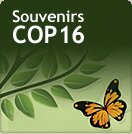Special Climate Change Program
| Special Climate Change ProgramSpecial Climate Change Program | |
|
The Government of Mexico acknowledges that climate change represents the primary global environmental challenge of this century and that, in the medium and long-term, it represents one of the greatest threats to human development and well-being. In addition to inducing the displacement of climatic regions, more droughts, floods, intense hurricanes, glacial melting and an increase in sea level, among other effects, climate change also leads to biodiversity loss, and the deterioration of water resources and environmental services provided by ecosystems.
Tackling climate change requires the immediate development of activities that mitigate or reduce greenhouse gas (GHG) emissions, and of others aimed at adaptation or reduction of vulnerability and of risk to human life, nature, and economic development. The effectiveness of these activities increases significantly when various sectors converge in a cross-cutting, mainstreaming policy strategy.
Even though long-term mitigation goals are still under discussion in multilateral fora, to avoid irreversible risks to society and ecological systems, it may be considered necessary that global greenhouse gas emissions reach a maximum in the next ten years and then decrease to a third of their baseline scenario in the year 2050. The nature and scope of the activities and processes required to guarantee this result are equivalent to a new Industrial Revolution.
Recently, several groups of experts in the scientific, economic and social aspects of climate change have raised the possibility that the risks posed are significantly more severe than outlined in previous estimates, such that current mitigation strategies are likely to need updating in the short term.
Besides being a threat, climate change also represents an opportunity to promote sustainable human development. The activities which Mexico intends to implement to develop its mitigation and adaptation efforts entail multiple co-benefits such as energy security, cleaner, more efficient and competitive production processes, improved air quality, and the preservation of natural resources, among others. Adopting the measures envisioned would thus be highly beneficial even in the absence of the climate change challenge.
Mexico enjoys the privilege of being one of the world’s most biodiverse countries. This will allow us to capitalize on those adaptation and mitigation measures involving the conservation and sustainable use of ecosystems and their environmental services, including the reduction of emissions from deforestation and forest degradation.
Over the next few years, the resilience – or capacity for recovery – of Mexico’s economic, social and natural systems to climate change will depend on the social, political and programmatic initiatives put in place to reinforce and restore their integrity, while reorienting development towards sustainability. For this to be possible, industrial, communications and energy infrastructure will need to be expanded and reconfigured, primary production will need to increase, and the conservation of natural ecosystems, their biodiversity and environmental services, land use planning and the relocation of settlements in high risk areas, will all need to be given greater impetus.
The Special Climate Change Program (PECC, for its acronym in Spanish) is based on the afore-mentioned guidelines and on previous planning efforts, particularly the National Climate Change Strategy (NCCS), submitted in 2007. The PECC builds on and develops the elements contained in the Strategy.
Through the PECC, the Mexican government sets out to demonstrate that it is possible to mitigate climate change and adapt to it, without jeopardizing the development process, and even deriving some economic benefit.
- Mexico’s general position
- National Communications
- Special Climate Change Program
- Executive Summary Special Climate Change Program 2009-2012 Mexico


Page 'Breadcrumb' Navigation:
Site 'Main' Navigation:


















Social Media Links:
Follow us: